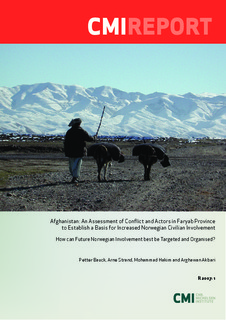| dc.contributor.author | Bauck, Petter | |
| dc.contributor.author | Strand, Arne | |
| dc.contributor.author | Hakim, Mohammad | |
| dc.contributor.author | Akbari, Arghawan | |
| dc.date.accessioned | 2007-08-13T11:11:08Z | |
| dc.date.accessioned | 2017-03-29T09:13:19Z | |
| dc.date.available | 2007-08-13T11:11:08Z | |
| dc.date.available | 2017-03-29T09:13:19Z | |
| dc.date.issued | 2007 | |
| dc.identifier.isbn | 978-82-8062-168-9 | |
| dc.identifier.issn | 0805-505X | |
| dc.identifier.uri | http://hdl.handle.net/11250/2436095 | |
| dc.description.abstract | The situation in Faryab province in northern Afghanistan is characterised by a substantial military and political uncertainty. Violent acts could at any moment hamper the humanitarian and development efforts. At the same time the risk is great that Norwegian development actors might be associated with a provincial administration, a police and a judicial system the population regard as corrupt, oppressive and inefficient. It is a great challenge to balance this relation and at the same time assist in developing these governmental bodies to strengthen their professionalism and legitimacy.
This is one of the main findings in the risk assessment assessing the conflict and actors in Faryab.
The report further point out that relation and the balance between the central state in Kabul and the local authorities on provincial and local level are of utmost importance for any future developments.
The report recommends a clearer demarcation between the Norwegian military involvement and the humanitarian and development activities.
Questions related to governance are both important and challenging. Not least given a rather unclear situation where some governance bodies draw their legitimacy from the constitution, others grow out of development programmes while the traditional structures often continue to hold the strongest legitimacy in the population.
The report underlines that the ethnic dimension constitutes a possible line of conflict, not only in Faryab but generally in Afghanistan.
Lack of information in the local population about the mandate of the Norwegian military presence through the Provincial Reconstruction Team (PRT) should also be viewed as a challenge for the humanitarian engagement. A wider dissemination of information on the PRT Mandate and activities financed by Norway needs to be secured.
Violence against women has a high occurrence in Faryab. Norway should prioritize to make work outside the homes available for women and to strengthen the availability of higher education. | |
| dc.language.iso | eng | |
| dc.publisher | Chr. Michelsen Institute | |
| dc.relation.ispartofseries | Research report | |
| dc.relation.ispartofseries | R 2007: 1 | |
| dc.subject | Conflicts | |
| dc.subject | Peace keeping | |
| dc.subject | Military involvement | |
| dc.subject | Humanitarian assistance | |
| dc.subject | Afghanistan | |
| dc.subject | Norway | |
| dc.title | Afghanistan: An Assessment of Conflict and Actors in Faryab Province to Establish a Basis for Increased Norwegian Civilian Involvement. How can Future Norwegian Involvement best be Targeted and Organised? | |
| dc.type | Research report | |
